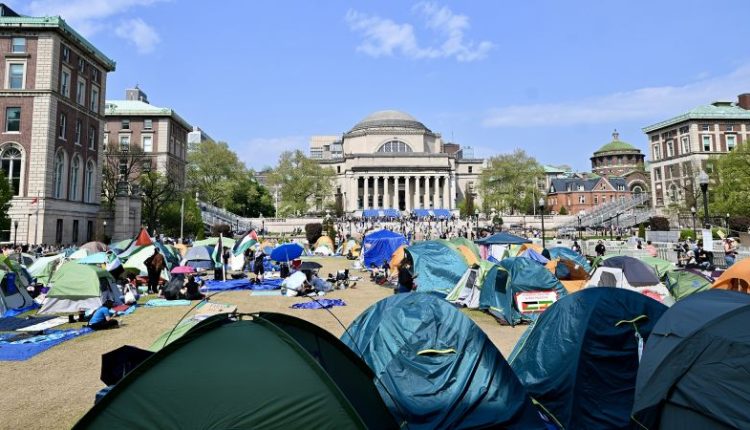Dozens of Columbia students were arrested for protesting last school year. Most are returning this fall
The majority of Columbia students arrested during protests over Israel’s war in Gaza will be returning to school this fall.
Dozens of students arrested and placed on interim suspension in the spring will return to campus and enroll in classes while awaiting disciplinary hearings. That’s according to a report released Monday by a Congressional committee investigating the school’s response to antisemitism.
Among the returning students include many who were arrested during protests in late April, when the university first ask law enforcement to break up university encampments, and those who later barricaded themselves inside Hamilton Hall, one of the campus buildings also occupied during the 1968 student protests.
Of the 40 students first arrested by the New York City Police Department on April 18, the report says, only two remain suspended. The rest are currently in good standing pending a hearing, though 17 remain on “disciplinary probation.” Charges against these students were eventually dropped.
Twenty-two students were arrested for occupying Hamilton Hall on April 30. Four of those remain not in good standing, with 3 under interim suspension and 1 on disciplinary probation from a prior hearing.
The report follows a request for information on the student cases by the House Education and Workforce Committee – part of a larger effort by House Republicans to combat antisemitism on college campuses and Ivy League institutions.
Rep. Virginia Foxx, the Republican chair of the Education committee, said Columbia has “waved the white flag in surrender while offering a get-out-of jail-free card to those who participated” in the protests.
“The failure of Columbia’s invertebrate administration to hold accountable students who violate university rules and break the law is disgraceful and unacceptable,” Foxx said in a press release Monday. “Breaking into campus buildings or creating antisemitic hostile environments like the encampment should never be given a single degree of latitude—the university’s willingness to do just that is reprehensible.”
The university said Tuesday the disciplinary process is ongoing for many students involved in the disruptions, including some of those who were arrested, and the school has been working to expedite the process for this “large volume of violations.”
“Columbia is committed to combating antisemitism and all forms of discrimination and taking sustained, concrete action toward a campus where everyone in our community feels valued and is able to thrive,” a university spokesperson told CNN.
Columbia was the epicenter of pro-Palestinian student protests during the last school year, but protests roiled universities across the country. Most of the protests were peaceful, but some erupted into violence and disrupted academic life on campus. Some Jewish and Muslim students said they were intimidated, harassed or physically assaulted
Some schools — like Yale and Brown —cleared encampments on campus, while chaos engulfed others. Classes were canceled at UNC Chapel Hill, where dozens of students were detained. At least five protesters were arrested at Florida State University. More than 1,000 people were arrested by law enforcement on various campuses.
Columbia says it has been working on a plan this summer in preparation for potential protests in the upcoming semester, especially during the one-year anniversary of the October 7th terrorist attacks on Israel, according to a spokesperson at Barnard, Columbia’s women-only college.
Earlier this month, the university announced only those who have a valid Columbia University ID will be allowed onto campus while some entry points remain closed.
Read the full article here

